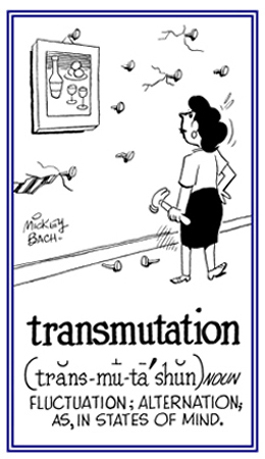-ation, -ization (-iz[e] + -ation); -isation (British spelling variation)
(Greek > Latin: a suffix; action, act, process, state, or condition; or result of doing something)
Although there are over 1,450 word entries ending with -ation or -ization listed in this unit, there are certainly many more which exist in the English language. At any rate, this unit provides a significant number of -ation and -ization examples for you to see.
2. The testimony given.
3. A fact or object; such as, a document, etc.; serving as evidence or proof.
Either the whole house or a single area may be heated to 150 degrees and more.
There is little scientific data on freezing and heating methods and both have drawbacks. Heating or thermagation is a non-chemical possibility but it can damage furniture, cosmetics, computers, tapes, CDs, foods, and any object that cannot withstand 140 to 150 degrees Fahrenheit; all must be removed from the premises and the price often is higher than fumigation.
Freezing uses liquid nitrogen to kill termites. It has proven to be an excellent non-toxic remedy in localized situations, but it is not particularly recommended for large areas.
Holes are drilled into the walls and liquid nitrogen under pressure is applied through the holes. Termites are 90 percent water and the nitrogen freezes them and they burst.
The energy of the atoms is thermal in origin and neutrons with reduced energies are termed thermal neutrons.
Destruction and removal of tissue by thermocoagulation utilizes high-frequency electric currents:
In medical thermopenetration, the tissues are heated but not damaged; however, in surgical diathermy (electrocoagulation) tissue is destroyed because of the use of a high-frequency electric current to bring about the coagulation and destruction of such tissue.
2. A significant change in the form or the appearance of someone or something; a metamorphosis.
2. The moving of the soul into another body after death, according to the opinion of Pythagoras.
3. A form of metempsychosis or rebirth which teaches that at death the soul leaves the body to be reborn in another body as a baby. It is closely associated and often confused with reincarnation.
4. In medicine, movement from one site to another which may entail the crossing of some usually limiting barrier, as in the passage of blood cells through the walls of the vessels.
5. In medicine, a wandering, especially a change of place from one side of the body to the other.
Ann's transmutations of sketches into works of outstanding art enticed many people to visit her exhibition.
More communities have successfully made transmutations of water power into electrical power.
2. The process of modifying a situation from one condition to another one: One example of transmutation can be when a person is having trouble making a final decision about how to accomplish an objective or how to get something done.
Go to this Word A Day Revisited Index
so you can see more of Mickey Bach's cartoons.
2. The conveyance, or means of getting, things or people from one place to another: James doesn't own a car and so he relies on public transportation to get around.


